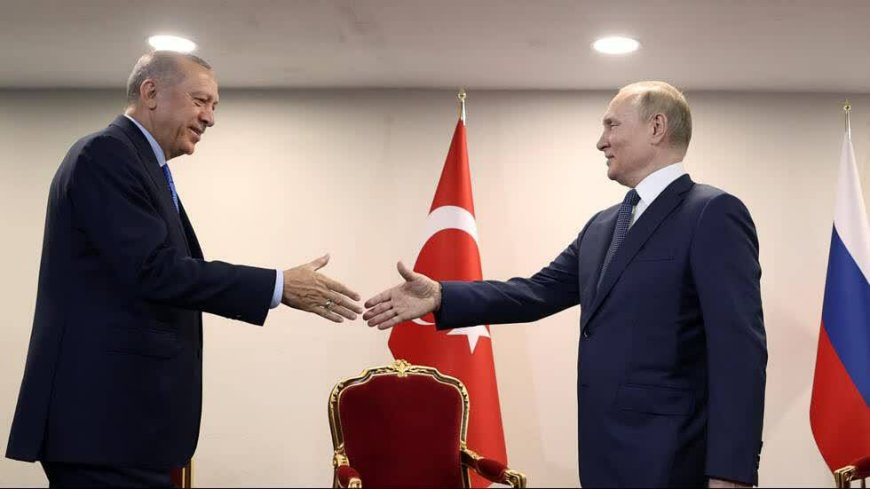Turkey's Intricate Balancing Act: Decoding Erdoğan’s Complex Relationship with Moscow
Turkey's Intricate Balancing Act: Decoding Erdoğan’s Complex Relationship with Moscow

In a recent meeting between President Recep Tayyip Erdoğan and President Vladimir Putin, the intricate and multifaceted nature of Turkish foreign policy once again came to the forefront, leaving Western experts and analysts perplexed about Turkey's stance towards Russia. Moreover, this meeting resulted in a mutually beneficial agreement aligned with Russia's interests, solidifying it as a win-win outcome for both nations.
Just a couple of months ago, many in the West speculated that Erdoğan might distance himself from what they perceived as his overly close relationship with Putin. However, Erdoğan's warm meeting with President Biden and his decision to allow prominent Ukrainian commanders, held in Turkey as part of a prisoner swap deal, to return to the battlefield, thereby angering Russia, challenged those assumptions.
Erdoğan also abandoned his resistance to Sweden joining NATO and reinforced the military alliance's efforts to isolate Russia. Nevertheless, the meeting in Sochi between Erdoğan and Putin did not indicate any significant shift in Erdoğan's delicate balancing act between Russia and the West. The two leaders stood side by side, expressing their commitment to expanding their countries' partnership. Despite the efforts of Erdoğan's NATO allies to cripple Russia's economy and restrict its access to global energy markets, the leaders announced plans to increase trade and collaborate on energy issues. They also discussed the resumption of an agreement allowing Ukrainian grain exports via the Black Sea, although no concrete progress was announced.
Experts believe that the warm encounter between the leaders showcased the stability and intertwined nature of their relationship, indicating the likelihood of further development across various fields. This is primarily because both sides stand to gain more from engaging with each other rather than antagonizing one another.
Turkey has played a crucial role as a conduit for Russia, refusing to join Western sanctions and continuing to provide essential goods. For Turkish exports, struggling amidst an economic crisis, Russia serves as a suitable market that can help bolster the country's economy. Additionally, Russia's agreement to defer the payment of imported gas fees and allow alternative currency payments alleviated pressure on Turkey's foreign exchange reserves. Moreover, the deposit of Russian funds in the Central Bank of Turkey has further strengthened the Turkish government's financial situation.
The evidence suggests that Erdoğan has deftly navigated the delicate task of appeasing his NATO allies while safeguarding the numerous advantages of his relationship with Putin. During this summer, Erdoğan sought warmer relations with his NATO allies, signaling a "new trend" with the United States in his meeting with President Biden. He welcomed Ukrainian President Volodymyr Zelenskyy in Turkey and expressed support for Ukraine's NATO membership, a stance that did not sit well with Russia.
Putin benefits from his open channel with a NATO country's leader as it provides him with an indirect means to communicate his views to the rest of the alliance, occasionally causing frustration among other NATO members. This unique diplomatic role allows Turkey to facilitate prisoner exchanges and grain deals, which are perceived as aiding food shipments to impoverished nations. However, Erdoğan's refusal to distance himself from Putin has disappointed his NATO allies and raised questions about his allegiance.
Previously, Turkey and Russia had explored the possibility of establishing a gas hub in Turkey, an idea that appealed to Erdoğan as a means to enhance Turkey's position in global energy markets and enable Russia to sell gas to countries that do not have direct purchasing arrangements. During the Sochi meeting, Putin mentioned that Russian state energy giant Gazprom had provided a "roadmap" for the project to its Turkish counterpart, BOTAS.
However, energy experts have expressed skepticism regarding the practicability of Putin's proposal, given the unlikelihood of the EU approving new Russian gas pipelines or seeking increased supplies from Russia. Europe has made significant efforts to reduce its reliance on Russian gas imports and diversify its sources, including shipments of liquefied natural gas from the United States, Qatar, and other countries. Having overcome the initial shock of decreasing dependence on Russia, Europe is now reluctant to backtrack.
Another notable aspect of this meeting was Russia's emphasis on the transfer of grain from Qatar, a neighboring country to Turkey. Putin's stance served as a response to certain approaches by the Turkish government and a reminder to his domestic critics that he is not in a position of weakness. Overall, this meeting resulted in a win-win situation for both sides, with potential implications for Europe and less privileged nations.
It is hoped that the positive relations between the Turkish and Russian governments will lead to the revival of the grain agreement and contribute to the alleviation of food inflation worldwide. Furthermore, the Turkish government's ability to mitigate economic challenges through expanding relations with Russia while maintaining its role as a key player and power broker in international affairs underscores its advantageous position.













































